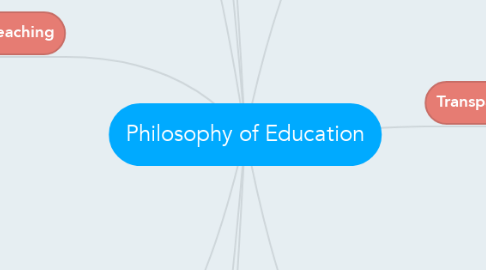Philosophy of Education
저자: Aaron Stephens

1. Collaborative Learning
1.1. group work, team-based
1.2. experiencing different roles within teamwork scenarios to gain an appreciate for all aspects of a team
1.3. enabling students to utilize other peers as a resource and/or expert in that topic
1.4. peer-tutoring: learning by doing. Is a benefit to both students. Demonstration and teaching allows for increased retention and comprehension of material
2. Fostering creative environment
2.1. failure is an option. learning from mistakes is needed
2.2. inquiry-based learning
2.3. stimulating critical thinking skills for problem solving
2.4. experiential, hands-on learning
2.5. implementing differentiated instruction for multitudes of learners
3. Transparent communication
3.1. Self-Assessment
3.2. Peer-assessment
3.3. Student-assessment
3.4. establishing connections between student, teacher, parent, administration and community
4. Discovering Students' Passions for Learning
4.1. introducing students' culture and interests into planning
4.2. recognizing extra-curricular activities and addressing them in class
4.3. enthusiasm for all subjects. Not neglecting anyone's interests
4.4. infusing student driven discussions
4.5. collaborative building of assignments, success criteria, and assessments
4.6. acceptance and inclusive environment
5. Promoting Self-Efficacy
5.1. developing self-directed learning
5.2. goal setting
5.3. encouraging work on areas of need
5.4. displaying areas of strength
5.5. establishing needs and wants of students
5.6. allowing opportunities for all students to have confidence through leadership
6. Holistic Teaching
6.1. teaching the whole child; not subject-specific teaching
6.2. incorporating cross-curricular links to core foundations of teaching
6.3. having high levels of achievement for every single student
6.4. creating an environment that will have students learning both social and academic skills
6.5. creating connections between subjects for a rich learning experience
7. Religious Education in Teaching
7.1. bringing faith and teaching of Catholic values into daily practice
7.2. role-model for Catholic education
7.3. modelling faith into professional and personal life
7.4. volunteerism and joining community initiatives to create meaningful relationships with students and community
8. Safe, Inclusive and Restorative Practice
8.1. no pre-judging students or assumptions
8.2. every day is a new day
8.3. treating students with respect and getting to the root of the problem
8.4. all students can succeed
8.5. political correctness; being aware of gender and sexuality
8.6. implementing restorative problem solving to reduce occurring offences and overall well-being of all students
9. As, For, & Of Learning
9.1. promoting process and development of key concepts
9.2. allowing students to showcase learning over time and not as a strict evaluation such as a test
9.3. feedback--introducing descriptive feedback to enhance skills and improve them over time
9.4. rich assessment tasks that are co-created with students to ensure a higher level of engagement
9.5. differentiated assessment: unconventional means of evaluation that will allow students to truly show what they have learned and not what they are being tested on
9.6. becoming competent in emerging forms of applicable assessment
10. Life-Long Learner
10.1. professional obligation to students to continually learn
10.2. being the best I can be, because I owe it to myself and more importantly, my students
10.3. always improving, enhancing, refining and reflecting on my teaching practice to provide the best possible learning for my students
10.4. not becoming complacent, each generation of children have different needs


